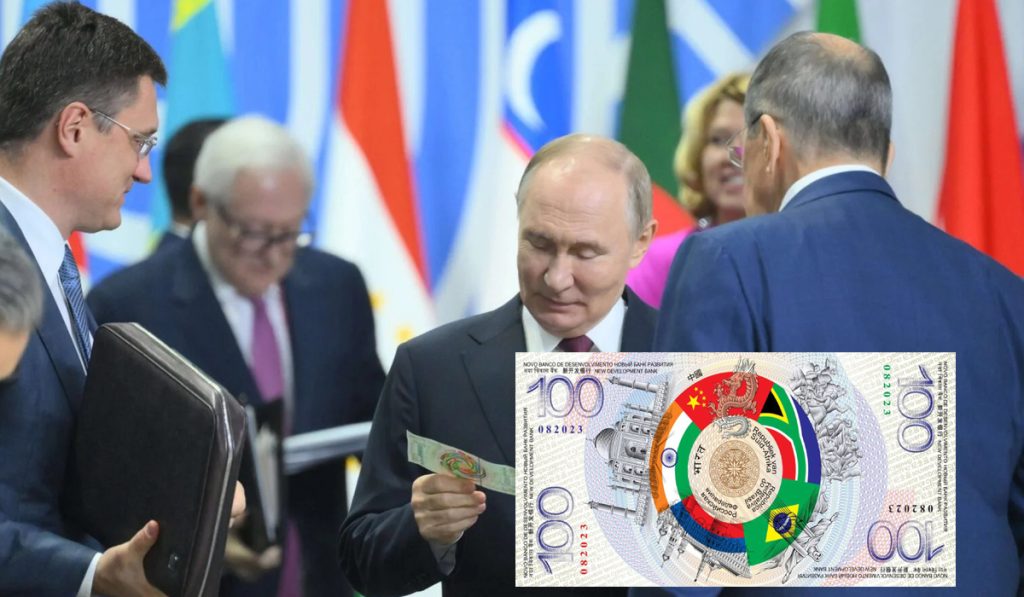In October 2024, Russia hosted the BRICS Summit in Kazan, aiming to showcase solidarity among developing nations and Eastern interests. This event took place against the backdrop of severe NATO sanctions stemming from the war in Ukraine. Notably, Russia has successfully established economic partnerships with BRICS nations while navigating Western economic controls and maintaining solid export revenues despite its exclusion from the SWIFT banking network. Contrary to predictions of an imminent collapse, Russia has remained resilient, largely due to its rich resource base. With commodities trading, in particular, offering advantages in an inflationary climate, the BRICS Summit highlighted the perceived decline of Western financial influence.
During the summit, President Putin introduced a symbolic “BRICS bank note” and called for the establishment of an international payment system that would move away from dollar dependency. The media’s quick dismissal of this idea as a mere joke overlooked the lengthy efforts of BRICS nations to create a multilateral currency that could serve as an alternative to the US dollar. Political figures like former President Donald Trump have recognized the seriousness of this initiative—Trump has indicated that he would respond to any threats against the dollar’s status with increased tariffs. However, such measures may not prevent developing nations from seeking alternatives to the dollar, as Putin suggested that efforts to reinforce dollar dominance could backfire.
The foundation of the dollar’s reserve status has its roots in the Bretton Woods Agreement of 1944, which linked America’s economic advantages to its military support for allied nations under NATO. Over the decades, this arrangement has allowed the US to enjoy the benefits of a dominant currency while bearing significant military obligations for global allies. However, this unspoken pact is increasingly being questioned, especially by Eastern nations that view NATO as an adversary rather than a partner. The precarious nature of current geopolitical tensions, including conflicts in Ukraine, Israel, and other regions, could prompt more nations to reconsider their currency alignments.
In addition to rising tensions at a global level, the United States faces significant internal challenges, including a prolonged stagflation crisis and escalating national debt, which has surged by $6 trillion in just two years. The country’s debt-to-GDP ratio has reached an unsustainable 124%. Although there have been no catastrophic economic disruptions as of now, the potential loss of the dollar’s reserve status could lead to severe consequences, particularly if no effective strategies to manage such a transition are put in place. Amid these tensions, globalist institutions like the IMF and BIS are preparing to launch Central Bank Digital Currencies (CBDCs) that could further undermine the dollar’s position.
The pandemic era has seen calls for a “Great Reset,” largely centered on an economic and currency reset that would diminish the dollar’s role. According to figures such as Klaus Schwab, these changes could potentially lead to a shift toward cashless systems and alternative currencies. However, these ideas also imply that the Bretton Woods framework, which has supported the dollar’s dominance, is being dismantled. This creates an urgent need for individuals and businesses in the US to prepare for future financial instability, as the economic landscape is being reshaped in ways that could drastically affect the current system.
Ultimately, maintaining the dollar’s status as a global currency seems increasingly untenable given the prevailing geopolitical circumstances and the ambitions of globalist organizations. Rather than relying on punitive measures against BRICS nations to maintain dollar dominance, relevant stakeholders, particularly in the US, should focus on developing a plan to anchor the currency with tangible assets and to promote domestic manufacturing capabilities. Without proactive measures, the US risks being caught unprepared for the larger crises on the horizon, making individual financial security, such as investing in assets like Gold IRAs, more essential than ever. As the challenges mount, the importance of preparedness and resilience against forthcoming economic shifts cannot be overstated.

